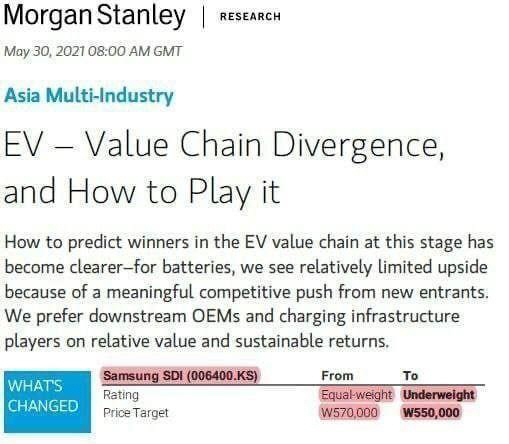[News Focus] Samsung SDI lagging behind in battery expansion race?
Battery maker falls short of investor expectations
By Kim Byung-wookPublished : June 1, 2021 - 16:31

In the race for leadership in the battery business, it looks like Samsung SDI is the slowest mover.
While global competitors, including crosstown rivals LG Energy Solution and SK Innovation, have announced ambitious tie-ups and expansion plans -- even targeting the world’s largest market, the US -- Samsung SDI has produced no such news.
Shares in Samsung SDI, traded on Korea’s main Kospi bourse, took a battering this week following a Morgan Stanley downgrade.
In its note, the global brokerage cut the target price for Samsung SDI to 550,000 from 570,000 won, saying that the global electric vehicle market is expected to enjoy annual growth of 20 percent over the next 10 years, and battery manufacturers are failing to generate enough profits as their primary focus is currently on expansion and market share.
As of the market’s close on Monday, Samsung SDI shed 1.7 trillion won ($1.5 billion) in market cap, as the stock price dropped 3.91 percent on the day. In Tuesday’s trade, the shares traded mostly flat near the previous day’s close at 615,000 won.
However, some local experts question whether the Morgan Stanley downgrade is fair, as the company is doing exactly the opposite -- putting profitability first and expansion later.
“Among three major Korean battery makers, including LG Energy Solution and SK Innovation, Samsung SDI is the only one that doesn’t have a battery plant in the US and hasn’t formed a joint venture with automakers. The strategy reflects Samsung Group’s overall style, which is avoiding a game of chicken,” said Han Byung-hwa, an analyst at Eugene Investment & Securities.
“Rather than cutting prices to find new customers, Samsung SDI is consolidating partnership with loyal clients such as BMW. Two have recently joined hands to develop a next-generation battery.”
According to Han, Samsung SDI lacks motivation to build a new battery plant in the US as General Motors and Ford -- two top automakers taking a key role in President Joe Biden’s push for EVs -- have already formed joined ventures with its LGES and SKI, respectively.
Unlike LGES and SKI, Samsung SDI doesn’t have automaker partners in the US who can guarantee massive battery supply deals. Samsung SDI recently signed a deal to supply batteries to Rivian, a local EV startup backed by investments from Amazon and Ford, but Rivian alone won’t be enough to draw Samsung SDI to the US mainland.
“Samsung SDI is carefully navigating when it should expand to the US. The timeline will hinge on the United States-Mexico-Canada Agreement, or USMCA,” an industry source said.
Under the free trade agreement, which took effect last July, automakers will have certify by 2023 that 75 percent of their EV components are made in one of the three countries to avoid tariffs in the region. Considering that a battery plant takes two to three years for completion, Samsung SDI has to make foray into the US in 2022 at the latest, should it decide to do so.
Park Se-hyuk, a former analyst at Seoul-based SNE Research, says Samsung SDI’s expansion may seem slow, but it’s at the right moment.
“Globally, cylindrical batter cells are selling like hotcakes because the products have various applications including EVs, energy storage systems and e-bikes. Due to the soaring demand, cylindrical battery cells are profitable, which is why Samsung SDI is mulling the expansion of its cylindrical battery factory in China,” Park said. Samsung SDI manufactures two types of batteries -- cylindrical battery cells and prismatic battery cells.
“Samsung SDI’s principle is ‘getting the fair price.’ Also, for Samsung Group as a whole, their priority is on other businesses such as chips, smartphones and auto parts.”
The analyst added that it will be difficult for Samsung to pursue the battery business with existing key businesses. For example, Samsung Electronics spent $8 billion to acquire the US car electronics maker Harman International in 2016.
“Samsung Group can’t go all-in on Samsung SDI’s business. Rather than splurging money on expansion, Samsung SDI is likely to divert its investments into the research and development of next-generation solid-state batteries, which are deemed as the game changer to replace the current lithium-ion batteries.”
Samsung SDI plans to mass-produce solid-state batteries starting 2027. Solid-state batteries contain solid electrolytes instead of liquid electrolytes, which translates to lighter weight and greater strength.
By Kim Byung-wook (kbw@heraldcorp.com)








![[Graphic News] More Koreans say they plan long-distance trips this year](http://res.heraldm.com/phpwas/restmb_idxmake.php?idx=644&simg=/content/image/2024/04/17/20240417050828_0.gif&u=)
![[KH Explains] Hyundai's full hybrid edge to pay off amid slow transition to pure EVs](http://res.heraldm.com/phpwas/restmb_idxmake.php?idx=644&simg=/content/image/2024/04/18/20240418050645_0.jpg&u=20240419100350)





![[From the Scene] Monks, Buddhists hail return of remains of Buddhas](http://res.heraldm.com/phpwas/restmb_idxmake.php?idx=652&simg=/content/image/2024/04/19/20240419050617_0.jpg&u=20240419175937)

![[KH Explains] Hyundai's full hybrid edge to pay off amid slow transition to pure EVs](http://res.heraldm.com/phpwas/restmb_idxmake.php?idx=652&simg=/content/image/2024/04/18/20240418050645_0.jpg&u=20240419100350)

![[Today’s K-pop] Illit drops debut single remix](http://res.heraldm.com/phpwas/restmb_idxmake.php?idx=642&simg=/content/image/2024/04/19/20240419050612_0.jpg&u=)